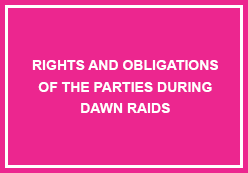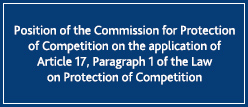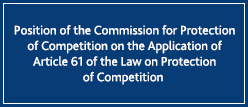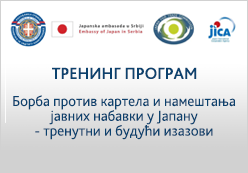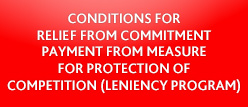 End of February and throughout March, the Commission for the Protection of Competition, based on publicly available information, became informed of the intention of all three mobile operators to raise the prices of mobile telephony services. In relation to this issue, the Commission has received several initiatives requesting an investigation into the potential existence of a competition infringement. Acting upon these initiatives, the Commission gathered and analyzed the regulatory framework, publicly available data, and requested statements from all three mobile telephony operators in the Republic of Serbia.
End of February and throughout March, the Commission for the Protection of Competition, based on publicly available information, became informed of the intention of all three mobile operators to raise the prices of mobile telephony services. In relation to this issue, the Commission has received several initiatives requesting an investigation into the potential existence of a competition infringement. Acting upon these initiatives, the Commission gathered and analyzed the regulatory framework, publicly available data, and requested statements from all three mobile telephony operators in the Republic of Serbia.
Upon analyzing the regulatory framework, the Commission established that, pursuant to Article 87 of the Consumer Protection Law and Article 131 of the Electronic Communications Law, there is an obligation to notify, in advance, mobile telephony service users, among others, of any price changes. Based on publicly available information, it was confirmed that all three mobile operators had announced price increases for their services in advance, including public notification methods, 30 days prior to the price changes. As per the statements submitted by the operators in response to the Commission’s request, prior to announcing the price increases, certain operators consulted with the National Consumer Organization of Serbia or informed the Regulatory Authority for Electronic Communications and Postal Services in advance, through official correspondence, of the planned price increases. The Commission notes that it did not evaluate whether the notification to mobile telephony service users was in accordance with the aforementioned regulations, nor whether such a method of notification was adequate; rather, the notifications were assessed solely from the perspective of enhancing transparency in the market.
In the theory of competition protection, it is well recognized that markets characterized by classic oligopolistic market structures, such as the mobile telephony market in the Republic of Serbia, are particularly conducive to the alignment of behavior among competitors. In this regard, the Commission specifically analyzed data regarding the timing of the price increase announcements and the amount of the increases, particularly considering media reports related to similarities concerning these two factors, as well as the behavior of mobile operators during previous price increases for the same service.
Concerning the timing of the price change announcements, as previously stated, all three operators complied with regulatory requirements by notifying customers of the price changes for mobile telephony services 30 days in advance. Based on the data provided by all three mobile telephony operators at the Commission’s request (including the sequence of price increase announcements, documentation published in this context, etc.), there were no reasonable grounds to assume the existence of a prior agreement regarding the price increases.
Regarding the amount of the price increases, it was also determined that there are no reasonable grounds to assume the existence of a prior agreement concerning this pricing element. Specifically, an analysis of the data submitted at the Commission’s request regarding price increases among all three operators—both for individual packages that are comparable and for the average values of the increases—revealed that the price increases are not equivalent, either in nominal terms or as a percentage, across the three mobile telephony operators under consideration.
Additionally, the Commission analyzed previous behaviors to ascertain whether there was any discernible pattern in the actions of mobile operators during earlier price increases for the same service. However, based on the available data, no such pattern was identified.
In the light of the factors previously outlined, as well as the fact that the operators publicly announced and published their price increases 30 days prior to the implementation of the new prices to ensure compliance with the Consumer Protection Law and the Electronic Communications Law, and noting that such notification methods were not observed during prior price increases for mobile telephony services, coupled with the absence of any behavior suggestive of prior collusion, it has been determined that, based on the collected evidence, no conclusions can be drawn regarding the existence of direct or indirect secret agreements.
Thus, in highly concentrated markets, a price change that is not associated with any prior agreement, and which is neither simultaneous nor equal in nominal or percentage terms, and has been communicated in advance to consumer organizations, the regulatory authority, and publicly disclosed in accordance with relevant regulations, is inadequate for the Commission to reliably infer behavior that would suggest a violation of competition law. This falls short of the legal standard required for the ex officio initiation of proceedings—specifically, the existence of reasonable grounds under Article 35 of the Law indicating that a competition infringement has occurred.



